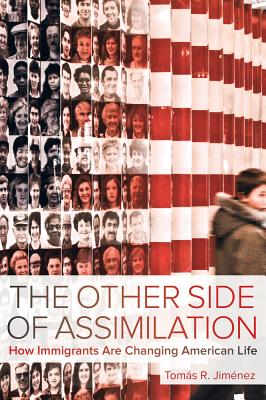

 University of California Press
University of California Press
The Other Side of Assimilation: How Immigrants Are Changing American Life


Key Metrics
- Tomas Jimenez
- University of California Press
- Paperback
- 9780520295704
- 9.02 X 5.98 X 0.67 inches
- 0.96 pounds
- Social Science > Emigration & Immigration
- English
 Secure Transaction
Secure TransactionBook Description
The Other Side of Assimilation shows that assimilation is not a one-way street. Jim�nez explains how established Americans undergo their own assimilation in response to profound immigration-driven ethnic, racial, political, economic, and cultural shifts. Drawing on interviews with a race and class spectrum of established Americans in three different Silicon Valley cities, The Other Side of Assimilation illuminates how established Americans make sense of their experiences in immigrant-rich environments, in work, school, public interactions, romantic life, and leisure activities. With lucid prose, Jim�nez reveals how immigration not only changes the American cityscape but also reshapes the United States by altering the outlooks and identities of its most established citizens.
Author Bio
Tomás Jiménez is a Professor of Sociology and Comparative Studies in Race and Ethnicity. He is also Director of the Undergraduate Program on Urban Studies. His research and writing focus on immigration, assimilation, social mobility, and ethnic and racial identity. His forthcoming book, States of Belonging: Immigration Policies, Attitudes, and Inclusion(Russell Sage Foundation Press) (with Deborah Schildkraut, Yuen Ho, and John Dovidio) uses survey data (with an embedded experiment) and in-depth interviews to understand how state-level immigration policies shape belonging among Latino immigrants, US-born Latinos, and US-born whites in Arizona and New Mexico.
His second book, The Other Side of Assimilation: How Immigrants are Changing American Life (University of California Press, 2017), uses interviews from a race and class spectrum of Silicon Valley residents to show how a relational form of assimilation changes both newcomers (immigrants and their children) and established individuals (people born in the US to US-born parents). His first book, Replenished Ethnicity: Mexican Americans, Immigration, and Identity(University of California Press, 2010), draws on interviews and participant observation to understand how uninterrupted Mexican immigration influences the ethnic identity of later-generation Mexican Americans.
The American Sociological Association’s Sociology of Latinos/as Section selected the book for its Distinguished Book Award. Professor Jiménez has also published his research in Science, American Sociological Review, American Journal of Sociology, Proceedings of the National Academy of Sciences, Social Problems, International Migration Review, Ethnic and Racial Studies, Social Science Quarterly, DuBois Review, Social Currents, Qualitative Sociology, and the Annual Review of Sociology.
In other lines of research, Professor Jiménez examines how immigration becomes part of American national identity by studying a sample of high school US history textbooks from 1930-2007. This research employs hand-coding and computer-assisted text analysis of the textbook sample. With Marrianne Cooper (Clayman Institute, Stanford University) and Chrystal Redekopp (Laboratory for Social Research, Stanford), he is studying how Silicon Valley residents find housing in one of the most expensive real estate markets in the world.
Professor Jiménez is embarking on new research examining how governments can effectively facilitate immigrant integration. As a Stanford Impact Labs Fellow, he is developing relationships with community partner organizations that will ultimately serve as collaborators in the research.
Professor Jiménez has taught at the University of California, San Diego. He has been named a Sigma Xi Distinguished Lecturer (2017-19). He has also been an Irvine Fellow at the New America Foundation and a Sage Fellow at the Center for Advanced Study in the Behavioral Sciences at Stanford University (CASBS). He was the American Sociological Association Congressional Fellow in the office of US Rep. Michael Honda, where he served as a legislative aide for immigration, veterans’ affairs, housing, and election reform.
His writing on policy has appeared in reports for the Immigration Policy Center and the Migration Policy Institute. He has written opinion-editorials on immigrant assimilation in several major news outlets, including The Washington Post, Los Angeles Times, CNN.com, The Chronicle of Higher Education, and the San Diego Union-Tribune. He has also offered commentary for media outlets, including NBC News, National Public Radio, and Univision.
Source: Stanford University - School of Humanities & Sciences
Videos






Community reviews
Write a ReviewNo Community reviews